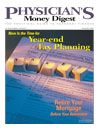Avoid the Biggest Money Mistakes
Everyone makes mistakes. That's why pencilshave erasers and computer keyboards havedelete keys. The problem is that some mistakesare much harder to erase or fix than others. In thecase of financial mistakes, the errors can provedownright costly.
Money
A recent survey of investors and financial advisorsby magazine and Merrill Lynch InvestmentManagers identified the financial mistakes that peopleare most likely to make. A professor of finance atPrinceton University then calculated how much theseerrors might actually cost the average family. Theaverage family makes two or three big mistakes overthe years that could drain an estimated $250,000 ormore out of retirement nest eggs. The good news,however, is that all these mistakes can be avoided byimplementing the following:
Money
1) Save more. Are Americans saving enough?Not according to a survey, which found thatalmost 50% waited too long to begin saving andinvesting. The average personal savings rate is currentlyless than 2% of annual income, nowherenear what it should be. Between work retirementplans, IRAs, and fully taxable investments, youshould save 10% of your gross income. If you'reover age 50, make that 15%.
2) Overly risky, overly conservative. If you'reage 40 and your investment portfolio containsfixed income and cash, you're way too conservative.In contrast, if you're age 60 and the majorityof your assets are in aggressive growth stocks, youcould be playing with fire. You must first understandyour goals at your particular stage in life tochoose your asset allocation. Financial plannerscan help, but if you'd rather do it yourself, use theFix Your Mix calculator to help you better balanceyour portfolio at www.money.com/tools, and clickon Asset Allocator.
Money
3) Overconcentration. A recipe for disaster isputting all our eggs in one basket, especially in thelong term. Many investors allocate too much moneyto their employer's stock or within their industry.suggests that you never hold more than 10%of your money in a single stock or in a mutual fundthat has a limited number of stocks. If you're investingin your own or a related industry, lower that percentageto 5%. As a physician, avoid overloading onhealth care investments and instead consider stocksof companies whose fortunes are completely independentof the pharmaceutical industry.
Money
4) Unrepeat performance. The financial mediais always quick to list the top-performing stocks andmutual funds each quarter or at the end of each year.However, according to , studies show that lastyear's top performers do not necessarily repeat. Infact, they may be stragglers within a relatively shortperiod of time. And since you don't know whenthey'll begin to fall, it's best to steer clear.
The solution:
5) Stop overtrading. Although buying and sellingstocks frequently might seem like fun, it's not agame of Monopoly. Investors who trade impulsivelyand frequently earn less than buy-and-hold investors,not to mention having to pay dramatically highercosts. In fact, most fanatical traders earn only 69%of the market's return. If you invest inindividual stocks, make sure you trade infrequently;if you prefer mutual funds, select portfolios withexpenses that run below 1% of assets.
Remember, your financial future does not comewith an eraser. By implementing these strategies, youcan avoid the common mistakes the average investormakes.
